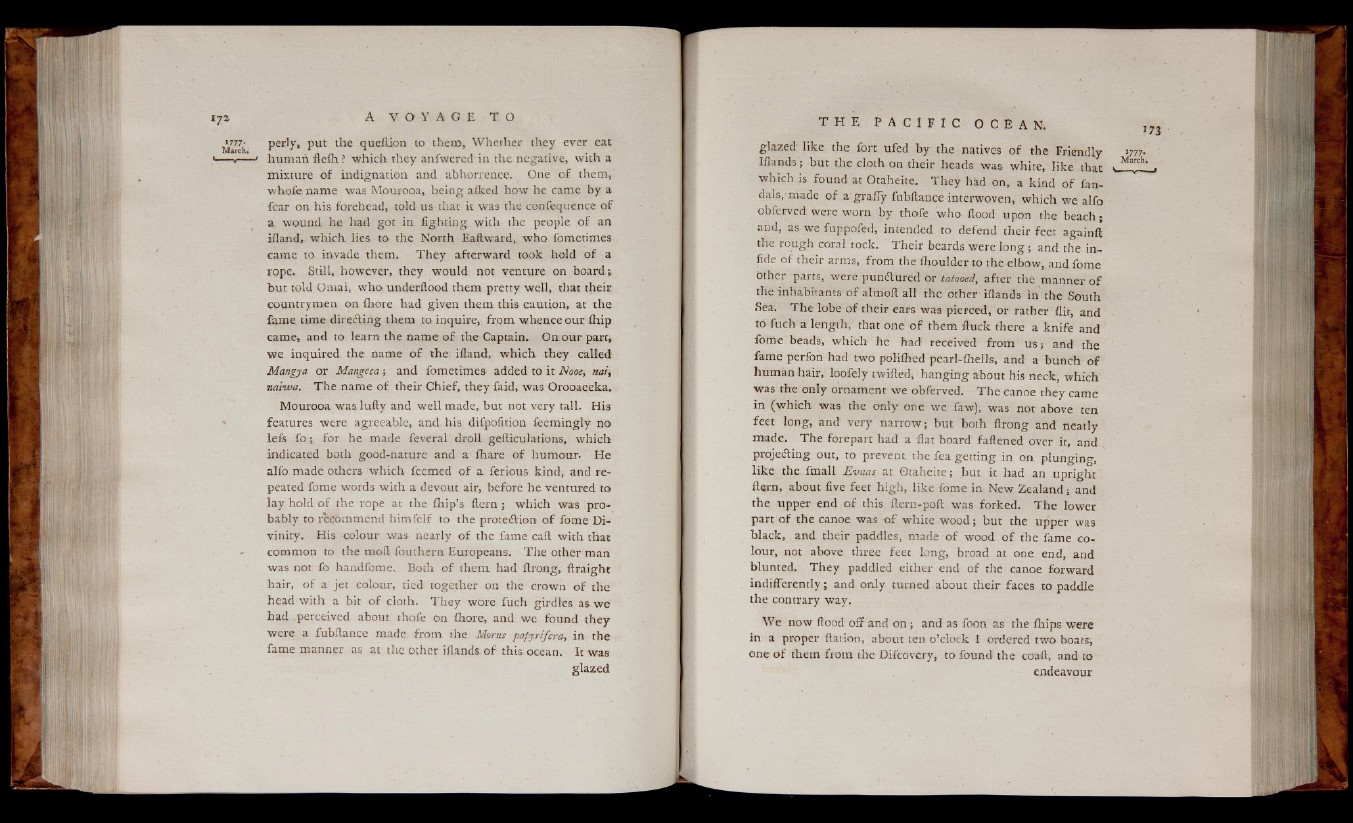
*777* perly, put the queition to them, Whether they ever eat
—v— human fleih ? which they anfwered in the negative, with a
mixture of indignation and abhorrence. One of them,
whofe name was Mourooa, being aiked how he came by a
fear on his forehead, told us that it was the confequence of
a wound he had got in fighting with the people of an
ifland, which lies to the North Eaftward, who fometimes
came to invade them. They afterward took hold of a
rope. Still, however, they would not venture on board t
hut told Omai, who underilood them pretty well, that their
countrymen on fhore had given them this caution, at the
fame time directing them to inquire, from whence our fhip
came, and to learn the name of the Captain. On our part*
we inquired the name of the illand, which they called
Mangya or Mangeea ; and fometimes added to it AW, nai,
naivua. The name of their Chief, they faid, was Orooaeeka.
Mourooa was lufty and well made, but not very tall. His
features were agreeable, and his difpbfition feemingly no
lefs fo j for he made feveral droll gefticulations, which
indicated both good-nature and a ihare of humour. He
alfo made others which feemed of a ferious kind, and repeated
fome words with a devout air, before he ventured to
lay hold of the rope at the ihip’s ftern ; which was probably
to recommend himfelf to the protection o f fome Divinity.
His colour was nearly of the fame call with that
common to the moll fouthern Europeans. The other man
was not fo handfome. Both of them had ftrong, firaight
hair, of a jet colour, tied together on the crown of the
head-with a bit of cloth. They wore fuch girdles as we
had .perceived about thofe on fhore, and we found they
were a fubilance made from the Morus papyrifera7 in the
fame manner as at the other iflands of this ocean. It was
glazed
glazed like the fort ufed by the natives o f the Friendly *777-
Iflands; but the cloth on their heads was white, like that s
which is found at Otaheite. They had on, a kind of fan-
dals. made of a graffy fubilance interwoven, which we alfo
obferved were worn by thofe who flood upon the beach ;
and, as we fuppofed, intended to defend their feet againft
the rough coral rock. Their beards were lon g ; and the- in-
fide of their arms, from the fhoulder to the elbow, and fome
bther parts, were punCtured or tatooed, after the manner' of
the inhabitants of almoft all the other iflands in the South
Sea. The lobe of theiF ears was pierced, or rather flit, and
to fuch a length, that one o f them ftuck there a knife and
fome beads, which he had received from u s ; and the
fame perfon had two polilhed pearl-ihells, and a bunch of
human hair, loofely twilled, hanging about his neck, which
was the only ornament we obferved. The canoe they came
in (which was the only one we fawj, was not above ten
feet long, and very narrow; but both ftrong and neatly
made. The forepart had a flat board fattened over it, and
projecting out, to prevent the fea getting in on plunging,
like the fmall Evans at Otaheite; but it had an upright"
ftern, about five feet high, like fome in New Zealand; and
the upper end of this ftern-poll was forked. The lower
part of the canoe was of white wood; but the upper was
black, and their paddles, made of wood o f the fame colour,
not above three feet long, broad at one end/and
blunted. They paddled either end of the canoe forward
indifferently; and only turned about their faces to paddle
the contrary way.
We now flood off and o n ; and as foon as the flhips were
in a proper ftation, about ten o’clock I ordered two boats,
one of them from the Difcovery, to found the coaft, and to
endeavour